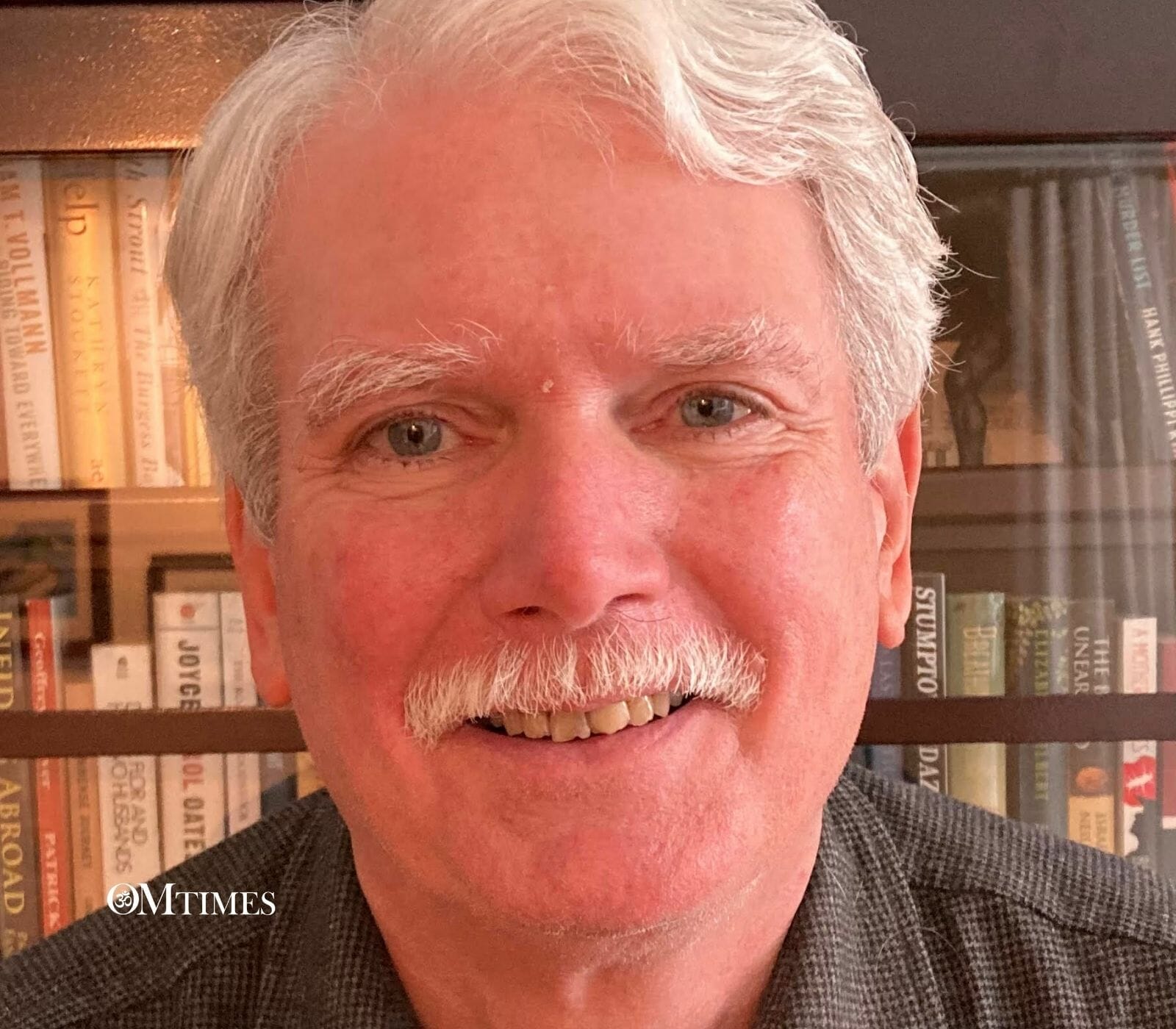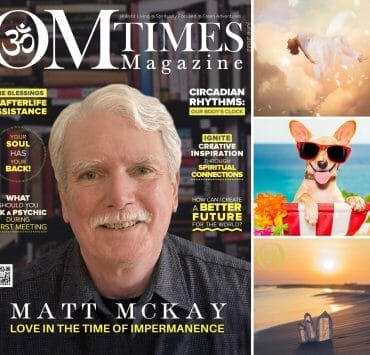Matt McKay – Love in the Time of Impermanence

Matthew McKay, Ph.D., is a clinical psychologist, professor of psychology at the Wright Institute, cofounder of Haight Ashbury Psychological Services, founder of the Berkeley CBT Clinic, and co-founder of the Bay Area Trauma Recovery Clinic, which serves low-income clients. Matt McKay has authored and co-authored more than 40 books, including The Relaxation and Stress Reduction Workbook and Seeking Jordan, and is the publisher of New Harbinger Publications. His latest work is Love in the Time of Impermanence.
An Interview with Matt McKay
OMTimes – Your new book, Love in the Time of Impermanence, looks at the certainty of change and loss and how both of those things can support rather than diminish love. Can you explain what you mean?
Matt McKay – In the physical world, everything we love will change and ultimately be lost. The objects we love will break, fade, or wear out. The places we love will erode in a fire, flood, encroachment, or neglect. The people we love will change in appearance, vitality, health, or aspects of personality. We may lose them to disease or death.
Yet the certainty of change and loss can strengthen and enhance love. We can hold whatever we love precious in the face of impermanence. We can cherish this moment and the next, knowing time sweeps everything away. Knowing each diminishment can be embraced, held. Knowing love can allow and accept every change without judgement, without running away.
Love can be the only permanent thing in a world of eternal change.
OMTimes – You have experienced loss in your life, how have you coped with it? What have you learned?
Matt McKay – I have learned that you cannot control or prepare for loss. Loss arrives in our lives, a blunt instrument of change. We must allow the waves of sadness to wash over us. And in the space between the waves, to act on love and do what matters. The storm of loss can rip down whatever sail we used to propel our lives. I had to start over when Jordan died. – What matters now? How do I go on without him? What is his death teaching me? How do I love in the face of this pain?
OMTimes – You talk about how to cultivate gratitude for every expression of love we encounter in our lives, can you tell me more about that?
Matt McKay – Gratitude is how we affirm life, how we remember each day, the gifts we are given. Gratitude isn’t some thankfulness mantra for having a house over our head or food in the cupboard, family, and friends. Gratitude is noticing each act of love that’s given: someone who smiles and greets you, someone who notices and pays attention, someone who lets you into their lane, someone who connects or reassures by touching your arm, someone who sees and understands you. Paying attention to each act of love brings love inside, into the heart. Gratitude for when we receive love reminds us that we are loved and loveable, no matter what changes.
OMTimes – You also write about the power of love after life – please explain what you mean?
Matt McKay – Love survives physical life. It is the energy that drives all relationships on earth and in the spirit world. Love is the medium of communication in spirit; it’s the telepathy that allows each soul to know and connect to another. Love is the gravitational force that (1) connects every soul to All, and (2) guides us to support and care for each other. Love is the power to see deeply into each other, see the pain and the beauty, and still accept and nurture what we see.
Love after life is the unbreakable connection between discarnate souls and all whom they’ve loved on Earth. The relationship between the living and dead can never be broken. It is eternal, just a thought away. The channel can open between us and ones on the other side with love, the mere intention to hold and hug. All we need to do is ask questions and listen.
OMTimes – Since we live in a world where nothing at all lasts forever, most of us live in fear, how can we change that?
Matt McKay – The first and most normal reaction to impermanence/loss is fear. And the hope to somehow control or prevent loss. Radical acceptance allows us to face loss and the fear of loss in a different, mindful way. It starts with noticing and making room for the pain – this person or thing we loved or counted on is gone. There is no going back to the days when we were together. We allow the wave of fear or pain to pass over us. Roiling and churning. And then we must look at what matters, what we care about. We focus on the next step, and the steps after it – where would love lead us? Who do we have to serve and care for in the face of this pain?
OMTimes – You have written a lot about the death of your son, Jordan, and how your love for him remains a living thing – please tell us how you kept that love alive? How did this love nourish you? And how we can do this for ourselves?
Matt McKay – When Jordan died, I was determined to remain connected to him. He was my heart, what I loved most deeply. I wanted to know if he still existed and if he was happy in spirit. I refused to give him up to the void, and instead sought ways to hear him, hold him. I learned how to do channeling, a simple process that anyone can do, to ask questions and hear answers. Jordan taught me to see and embrace what awaits us on the other side; to accept death, as a necessary transition; and to love all that I learn every day of my life.
The greatest gift from channeling Jordan was knowing he still loved me, he was still with me, that he could support and guide me. I hadn’t lost Jordan. The love between us will always be there. Though everything in the physical world will change, and be lost, the love between souls goes on forever.
OMTimes – You write that you have “witnessed the death of love. Many times.” Tell us about that.
Matt McKay – As a psychologist and couples’ therapist for more than 40 years, I’ve witnessed, over and over, how partners lose love. There are five ways that love diminishes in marriage: judging instead of compassionate accepting, using hurtful aversive strategies to exert control, win-lose fighting, ignoring a partner’s feelings and needs, and unwillingness to actively care. Any one of these can kill love. The more often they occur, the more toxic they become. What’s common to each of these ways is that they dehumanize the partner. The relationship becomes transactional and only valued to the extent a partner supplies what’s desired or needed.
For partners to find their way back to love, they must learn to see each other, have compassion for each other’s pain, and every day find ways to care for and support the other. In other words, they need to turn the intention to love into active behavior.
OMTimes – You write about the four elements of love, what are they and what do they mean?
Matt McKay – The four essential elements of love are care, knowledge, compassion, and intention. Care is the commitment to support, protect and nurture what we love. Active caring means doing something to enhance the well-being of a beloved person, place, or thing. Knowledge is the commitment to see, and understand, to apprehend all we can about the beloved. Intention is turning care, knowledge, and compassion into action. Into choices and behavior. Into an embrace.
The elements of love are four notes of a harmony. Each individual note is a gift; together they are the sound of love. They are love’s essence.
OMTimes – According to your work, you believe we must choose love, why do you think it is so hard for so many people to make this choice?
Matt McKay – On earth, in a physical environment, there are obstacles to love. There are physical obstacles: a parent who is too tired to help a child with homework or an emotional upset. There are emotional obstacles: feeling too angry, anxious, or depressed to respond with compassion or caring. There are judgmental or contemptuous thoughts that get in the way of love. There are needs and desires that drive us to ignore love.
We come to this planet to learn how to love in the face of pain. Love in the afterlife is effortless and freely given. Here we learn how to love while struggling with the physical, emotional, and “trying to survive” friction. That’s unavoidable on this plane. Love on earth is an enormous challenge and one we are privileged to face and learn from when we incarnate in the physical dimensions.
OMTimes – Your book seems so timely. Why do you think that is?
Matt McKay – We are in the midst of one of the great historical transitions; from the tribal to the “we are one” meme. The tribal meme is fighting hard to retain control – with angry populist leaders and movements trying to block the inevitable transition to the next meme. So, racism, sexism, nationalism, and “us against them” are surging in the last gasp of the tribal meme. Our work now is to support love, – the deep inner connectiveness of all conscious beings. That’s why “Love in the Time of Impermanence” is showing up, one note in a chord, in a chorus of voices helping us see why we’re here and where we’re going.
Connect with Matt McKay’s latest book, Love in the Time of Impermanence, on Amazon.
Click HERE to Connect with your Daily Horoscope on OMTimes!
Visit Our Astrology Store for Personalized Reports
OMTimes is the first and only Spiritually Conscious Magazine. Follow Us On Facebook, Twitter, Instagram, Linkedin, Pinterest, and Youtube
OMTimes Magazine is one of the leading on-line content providers of positivity, wellness and personal empowerment. OMTimes Magazine - Co-Creating a More Conscious Reality








